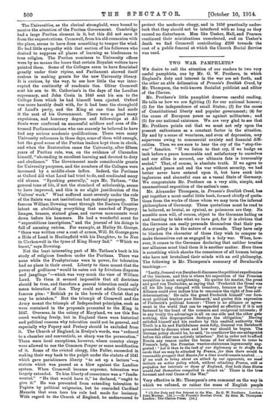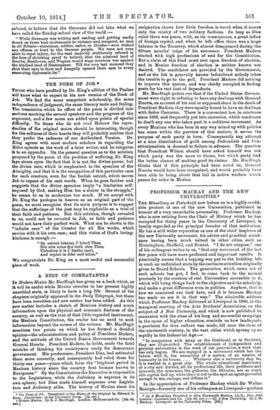TWO WAR PAMPHLETS.* Wn desire to call the attention of
our readers to two very useful pamphlets, one by Mr. G. W. Prothero, in which England's duty and interest in the war are set forth, and the other an able delineation of Prussia's Devilish Creed, by Mr. Thompson, the well-known Socialist publicist and editor of the Clarion.
Mr. Prothero's little pamphlet deserves careful reading.
He tells us how we are fighting (1) for our national honour; (2) for the independence of small States; (3) for the cause of Constitutional liberty and popular government; (4) for the cause of European peace as against militarism; and (5) for our national existence. We are very glad to see that Mr. Prothero points out that we must not rely upon the present enthusiasm as a constant factor in the situation.
By and by a sense of weariness, and even of depression, may supervene owing to commercial anxiety and financial diffi- culties. Then we are sure to hear the cry of the " stop-the- war" fanatics. "If we listen to that cry, if we budge an inch before a peace honourable and satisfactory to ourselves and our allies is secured, our ultimate fate is irrevocably sealed." That, of course, is absolute truth. If we agree to a patched peace and end the war without security, we had better never have entered upon it, but have sunk into inglorious and shameful ease as a vassal State of Germany.
We congratulate Mr. Prothero on a very able, simple, and unsensational exposition of the nation's case.
Mr. Alexander Thompson, in Prussia's Devilish Creed, has
put together a most useful little book, formed chiefly of quota- tions from the works of those whom we may term the infernal philosophers of Germany. These quotations must be read to be believed, so brutal, so cynical, so poisonous are they. No sensible man will, of course, object to the Germans hating us and wanting to take what we have got, for it is obvious that the Germans can easily persuade themselves that their pre- datory policy is in the nature of a crusade. They have only to blacken the character of those they wish to conquer to make themselves out as engaged in a holy war. When, how- ever, it comes to the Germans declaring that neither treaties nor alliances must bind them it is another matter. Here there is something which shocks the conscience of all human beings who have not brutalized their minds with an evil philosophy. The following is Mr. Thompson's summary of Bernhardi's teachings "Lastly, General von Bernhardi discusses the political expediencies of the business, and this is where his exposition of the Prussian moralities is most enlightening. He quotes his master, the great and good von Treitschke, as saying that 'Frederick the Great Was all his life long charged with treachery, because no Treaty or Alliance could ever induce him to renounce the right of free self- determination.' He calls the great Frederick himself our fore- most political teacher pace Bismarck,' and quotes this expression of Frederick's political honour : There is no alliance or agree- ment in the world that can be regarded as effective if it is not fastened by the bond of the common and reciprocal interests ; if in any treaty the advantage is all on one side and the other gets nothing, this disproportion destroys the obligation.' Having satisfied himself and his readers by this exalted authority that Truth is a lie and Faithfulness mere folly, General von Bernhardi proceeded to discuss when and how war should be begun. The German policy should be, he said, to overthrow the one antagonist before the other can actively interfere.' But in order not to afford Russia any reason under the terms of her alliance to come to France's help, the Prussian warrior-statesman ingenuously sug- gested : 'Let it then be the task of our diplomacy so to shuffle the cards that we may be attacked by France, for then there would be reasonable prospect that Russia for a time would remain neutral. . . . If we wish to bring about an attack by our opponents, we must initiate an active policy which, without attacking France, will so prejudice her interests or those of England, that both these States would feel themselves compelled to attack us.' There is the true forecast and real Cause of the War."
Very effective is Mr. Thompson's own comment on the way in which we refused, or rather the mass of English people (1) Our Duty and Our Interest in the War. By G. W. Prothero. London John Murray. [2d.]—(2) Prussia's Devilish Creed,. By Alex. N. Thompsoa London The Clarion Press. [1d.] refused, to believe that the Germans did not take what we have called the Sunday-school view of the world :- " While Germany was writing and reading and getting madly drunk on these base incitements to violence and conquest, no man in all Britain—statesman, soldier, sailor, or thinker—ever wished any offence or hurt to the German people. We were not even alert to repel injury, for the vast majority stubbornly refused in the face of shrieking proof to believe that the admired land of Goethe, Beethoven, and Wagner would wage covetous war against the kindred land of Shakespeare. Till the very last moment they shut their eyes to facts and hungrily opened their ears to every reassuring diplomatic lie."



































 Previous page
Previous page